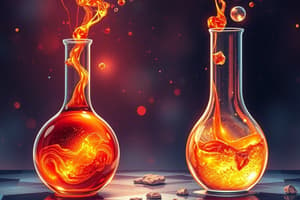Podcast
Questions and Answers
Matter is anything that has mass and occupies ______.
Matter is anything that has mass and occupies ______.
space
A ______ has a definite shape and volume; its particles are closely packed.
A ______ has a definite shape and volume; its particles are closely packed.
solid
The ______ point is the temperature at which a solid becomes a liquid.
The ______ point is the temperature at which a solid becomes a liquid.
melting
The ability of a substance to dissolve in a solvent is called ______.
The ability of a substance to dissolve in a solvent is called ______.
Inertia is the property of matter that causes it to resist changes in ______.
Inertia is the property of matter that causes it to resist changes in ______.
The mass of an object is measured in ______ or kilograms.
The mass of an object is measured in ______ or kilograms.
The ______ of matter states that matter cannot be created or destroyed.
The ______ of matter states that matter cannot be created or destroyed.
Flammability describes a substance's ability to ______ in the presence of oxygen.
Flammability describes a substance's ability to ______ in the presence of oxygen.
Flashcards are hidden until you start studying
Study Notes
Properties of Matter
- Definition: Matter is anything that has mass and occupies space.
- States of Matter:
- Solid: Definite shape and volume; particles are closely packed.
- Liquid: Definite volume but no definite shape; particles are close but can move past each other.
- Gas: No definite shape or volume; particles are far apart and move freely.
- Plasma: Ionized gas with free-moving ions and electrons; conducts electricity and is affected by magnetic fields.
Properties of Matter
-
Physical Properties: Characteristics that can be observed or measured without changing the substance.
- Color: Visual appearance.
- Density: Mass per unit volume; affects buoyancy.
- Melting Point: Temperature at which a solid becomes a liquid.
- Boiling Point: Temperature at which a liquid becomes a gas.
- Solubility: Ability of a substance to dissolve in a solvent.
-
Chemical Properties: Characteristics that describe the ability of a substance to undergo changes that transform it into different substances.
- Reactivity: How readily a substance combines chemically with other substances.
- Flammability: Ability to burn in the presence of oxygen.
- pH: Measure of acidity or alkalinity; affects chemical behavior.
Matter and Its Properties
- Mass: Amount of matter in an object; measured in grams or kilograms.
- Volume: Amount of space an object occupies; measured in liters or cubic centimeters.
- Weight: Force exerted by gravity on an object; depends on mass and gravitational pull.
- Inertia: Property of matter that causes it to resist changes in motion; related to mass.
- Conservation of Matter: Principle that matter cannot be created or destroyed in an isolated system; it can only change forms.
Definition of Matter
- Matter possesses mass and occupies space, categorizing everything in the physical universe.
States of Matter
- Solid: Has a definitive shape and volume with tightly packed particles that vibrate in place.
- Liquid: Maintains a fixed volume but adapts to the shape of its container, with particles closer together yet able to flow past each other.
- Gas: Lacks a definite shape and volume; particles are widely spaced, moving independently and freely.
- Plasma: A state of ionized gas containing free-moving ions and electrons, capable of conducting electricity and influenced by magnetic fields.
Physical Properties of Matter
- Characteristics: Observable or measurable without altering the substance.
- Color: The visual appearance of a substance.
- Density: Mass per unit volume, influencing the buoyancy of an object.
- Melting Point: The temperature at which a solid transforms into a liquid.
- Boiling Point: The temperature at which a liquid becomes a gas.
- Solubility: The capacity of a substance to dissolve within a solvent.
Chemical Properties of Matter
- Characteristics: Describe a substance's potential to undergo chemical changes.
- Reactivity: The propensity of a substance to chemically bond with others.
- Flammability: The ability of a material to ignite and burn in the presence of oxygen.
- pH: A measure indicating a substance's acidity or alkalinity, determining its chemical interactions.
Key Concepts Related to Matter
- Mass: The total quantity of matter in an object, measured in grams or kilograms.
- Volume: The physical space that an object occupies, gauged in liters or cubic centimeters.
- Weight: The gravitational force acting on an object, dependent on both mass and the strength of the gravitational field.
- Inertia: A property that causes matter to resist changes in motion, directly correlated with the object's mass.
- Conservation of Matter: A fundamental principle stating that matter cannot be created or annihilated within an isolated system; it can only undergo transformation from one form to another.
Studying That Suits You
Use AI to generate personalized quizzes and flashcards to suit your learning preferences.




